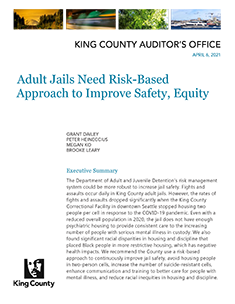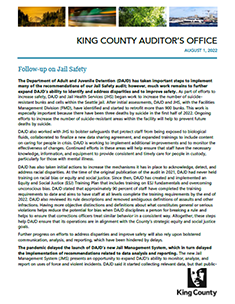Adult Jails Need Risk-Based Approach to Improve Safety, Equity
April 6, 2021
NEW! Download the latest follow-up report
The Department of Adult and Juvenile Detention lacks a robust risk management system to help keep the people in its care safe. Fights, assaults, and other violent incidents occur regularly in King County adult jails, although the rates of fights and assaults dropped significantly when, in response to the COVID-19 pandemic, use of two-person cells stopped at the King County Correctional Facility in downtown Seattle. Even with a reduced overall population in 2020, the jail does not have enough psychiatric housing to provide consistent care to the increasing number of people with serious mental illness in custody. We also found significant racial disparities in housing and discipline that placed Black people in more restrictive housing, which has negative health impacts. We recommend the County use a risk-based approach to continuously improve jail safety, avoid housing people in two-person cells, increase the number of suicide-resistant cells, enhance communication and training to better care for people with mental illness, and reduce racial inequities in housing and discipline.
This report contains references to suicide, sexual assault, and other traumatic experiences.
If you or someone you know is experiencing suicidal thoughts, you can call the 24-hour U.S. National Suicide Prevention Lifeline at 800-273-TALK (8255). You can also text HOME to 741741 to speak with a crisis counselor. Learn to recognize the warning signs of a mental health crisis by visiting the National Alliance of Mental Illness website.
If you or someone you know has experienced sexual assault, there are resources that offer support for survivors and people close to them. You can call the National Sexual Assault Hotline at 1-800-656-HOPE (4673) at any time. The King County Sexual Assault Resource Center provides critical support and direct services. To talk with someone immediately, call their resource line at 888-99-VOICE (86423).
Watch the presentation (25:06)
Status
Of the 25 recommendations:
| DONE | 4 | Recommendations have been fully implemented. Auditor will no longer monitor. |
|---|---|---|
| PROGRESS | 16 | Recommendations are in progress or partially implemented. Auditor will continue to monitor. |
| OPEN | 4 | Recommendations remain unresolved. Auditor will continue to monitor. |
| CLOSED | 1 | Recommendation is no longer applicable. Auditor will no longer monitor. |
Summary
The Department of Adult and Juvenile Detention (DAJD) manages risks to jail safety without a comprehensive risk management strategy. The jail has data on incidents and uses of force, but aging data systems make it difficult for staff to use that data to improve jail safety.
Fights and assaults occur regularly in King County adult jail facilities, but the King County Correctional Facility in downtown Seattle is a more dangerous facility for staff and people in custody than the Maleng Regional Justice Center in Kent. The practice of assigning two people to the same cell (double-bunking) contributes to this danger. Starting in March 2020, the County reduced the jail population due to the COVID-19 pandemic and was able to avoid double-bunking, leading to a significant drop in fights and assaults at the Seattle facility.
Since the fourth quarter of 2019, on average each day, more than 10 people who need psychiatric housing are not placed in psychiatric housing, making it difficult for them to receive commensurate care. At least one person has died in DAJD custody every year since 2009, and four suicides took place between 2017 and 2020. None of these took place in units with suicide-resistant cells.We found racial disparities in discipline and housing that harm Black people and benefit White people, on average. Black people were more likely to be in higher security units, get infractions for breaking the rules, and spend more time in restrictive housing as punishment. Effects of these inequities can go beyond the jail and have lasting negative health impacts.
Reports related to this audit
Currently, there are no related reports to this project.
Audit team
Grant Dailey, Peter Heineccius, Megan Ko, and Brooke Leary worked on this audit. If you have any questions or would like more information, please call the King County Auditor's Office at 206-477-1033 or contact us by email at KCAO@kingcounty.gov.

 Translate
Translate

